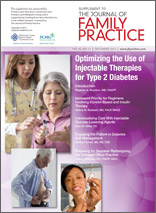User login
Article Type
Changed
Display Headline
Optimizing the Use of Injectable Therapies for Type 2 Diabetes
Sponsor
This supplement was sponsored by Primary Care Education Consortium and Primary …
Issue
The Journal of Family Practice - 62(12)
Topics
Page Number
S1-S32
Sections
Sponsor
This supplement was sponsored by Primary Care Education Consortium and Primary …
Sponsor
This supplement was sponsored by Primary Care Education Consortium and Primary …
Issue
The Journal of Family Practice - 62(12)
Issue
The Journal of Family Practice - 62(12)
Page Number
S1-S32
Page Number
S1-S32
Topics
Article Type
Display Headline
Optimizing the Use of Injectable Therapies for Type 2 Diabetes
Display Headline
Optimizing the Use of Injectable Therapies for Type 2 Diabetes
Sections
Disallow All Ads
Alternative CME
Consolidated Pubs: Do Not Show Source Publication Logo
Use ProPublica
Article PDF Media

